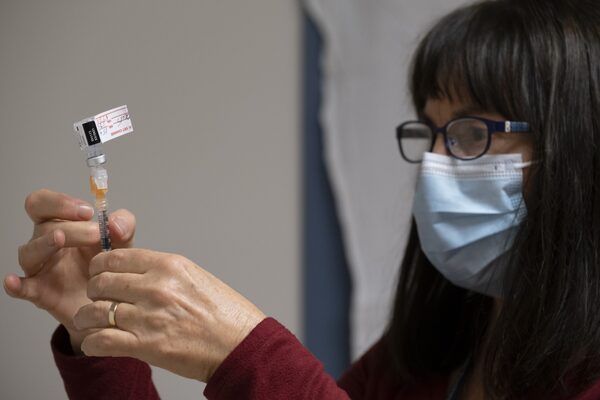
Heather Witzel-Garnhum, nurse clinician, prepares a syringe with the Pfizer-BioNTech COVID-19 vaccine at the Regina General Hospital in Regina on Dec. 15, 2020.Michael Bell/The Canadian Press
There was Justin Trudeau announcing the good news that Novavax will start making vaccines in Canada in late summer when reporters questioned whether it would not have been better to do something about that before the acute global shortage hit, rather than afterward.
The entire planet was caught off guard, Mr. Trudeau said, which is mostly true, as many countries are having trouble getting doses. But what about Britain, another journalist asked, noting it had ramped up its domestic vaccine capacity.
Mr. Trudeau replied by saying some words, including “there is always more that we can do,” “inspiration from other countries” and “lessons learned.”
So there it is: Canada has come belatedly to the realization that we are pretty much on our own for vaccines. Maybe part of the lesson is that could be true for other things, too.
Getting a domestic vaccine industry going is a good thing, even if we’re now in a better-late-than-never stage. Hindsight is 20/20, as the cliché goes.
But notice that Mr. Trudeau also mentioned his call this week with U.S. Vice-President Kamala Harris and the hunky-dory Canada-U.S. relationship we now enjoy. One had to wonder whether Mr. Trudeau used the chat to try to borrow some vaccine, or lean on that friendship, or try a little passive-aggressive guilt trip.
You know, like, “Can you help a friend out?” Or, “We know you’re rushing to vaccinate 100 million people in 100 days, but can you spot us a million doses till payday? Remember how great Montreal was, Kamala?”
But we heard nothing about such pleas. Anyway, it seems pretty clear the answer would be no.
It is no surprise that the U.S. vaccine program set up under former president Donald Trump was an America First endeavour. But under Joe Biden’s two-week-old administration, none of the vaccines produced at Pfizer’s plant in Kalamazoo, Mich., two hours from the border, are being shipped to Canada, either.
The U.S. government’s contracts with Pfizer apparently lock up the first 100 million doses, and there are blacked-out sections in its contract with vaccine-maker Moderna about its right of first refusal. Canada gets its supply from the European Union, which, under pressure from its own citizens, has floated the notion of restricting exports. In this dog-eat-dog world of vaccine competition, Canada has to cross its fingers.
That’s true for other countries. There are a few outliers outside the U.S. and Europe, such as Israel, and oil-rich Bahrain and United Arab Emirates, and Britain. But there are wealthy countries such as Japan, South Korea and Australia that haven’t started mass vaccinations. Developing countries are complaining rich nations like Canada have ordered more than they need.
Yes, Canada has friends and critical allies. But in this crisis, it is more or less alone in a me-first world. Trade agreements with the U.S. and the EU don’t offer protection, because they allow countries to refuse to export essential goods when there is a shortage. Canada relies on global supply chains. Now we realize it has to plan for when they break down.
Mr. Trudeau’s announcement on Tuesday was the good news that underlined how stark that reality is.
The government has signed an agreement that Novavax start making vaccines in Canada near the end of summer. That’s great. But their vaccines are scheduled to come off the production line at around the same time the program to vaccinate every adult Canadian will be completed. Mr. Trudeau also announced funding for another company expected to start making vaccines in 2023.
The PM is right that there might be a need for more COVID-19 vaccines, or new ones for new variants, and that Canada needs its own vaccine industry for the long term. We sure have learned that last part.
But it still feels like the proverbial locking of the barn door after the horse has bolted. At the very least, the horse is out in a field and Mr. Trudeau is starting the chase.
The lesson learned here isn’t just about vaccines. It’s that there are big powers with big advantages such as the U.S. and the EU and China, and smaller players like Canada can’t always rely on their kindness, or supply chains. It will have to plan ways to mitigate that risk. And plan ahead.
Know what is happening in the halls of power with the day’s top political headlines and commentary as selected by Globe editors (subscribers only). Sign up today.
 Campbell Clark
Campbell Clark